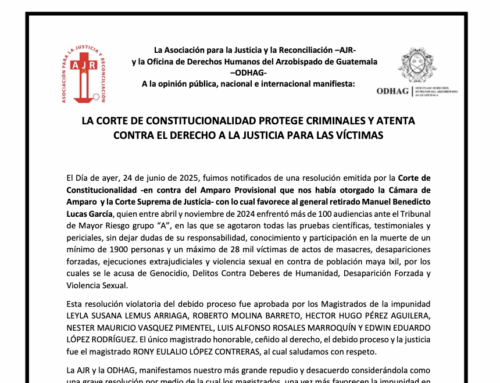While the United States pushes forward with the Alliance for Prosperity – allocating $750 million this fiscal year alone to Honduras, El Salvador and Guatemala – NISGUA talked with Fernando Solis, editor and political writer at El Observador, to get his insights into the plan, its goals, and who will be most affected. As a political economy journal, El Observador has been publishing in-depth reports for nearly 15 years on issues that affect Guatemala, the region, and the world. For articles in Spanish, click here.
What are the real goals behind the Alliance for Prosperity?
The Alliance for Prosperity in the Northern Triangle is framed as an anti-immigration plan that seeks to curb immigration [to the United States] through the economic growth and increased competitiveness [of Honduras, El Salvador and Guatemala]. The plan seeks to further entrench the neoliberal economic model within these countries through large-scale investments into the pillars that support the accumulation of wealth in a capitalist system: megadevelopment projects, extractive industries, and new forms of monocultures that produce the raw materials for a globalized world market.
The Alliance for Prosperity fits within Guatemala’s Development Plan K’atun 2032 and the UN Sustainable Development Goals, given that both frameworks are also based on this model of capital accumulation.
This is the first part of the plan.
The second important aspect is that large-scale investments into the aforementioned areas by American investors and their European, Mexican, and South American allies, requires security on two fronts. The first is the security for the project itself and a general strengthening of State security apparatuses, such as the police and military.
Secondly, large-scale investments and the side businesses they generate require a business climate based on “governability,” which is threatened by the growth of organized crime in its various forms; trafficking has given rise to mafia networks, narco-activity, corruption, and illegal and illicit business. These activities weaken the State and make governments lose control – particularly when members of the State themselves are involved in these criminal networks – and compete with “legal” businesses in terms of costs and tax losses.
Who will be most affected by the plan?
The United States doesn’t purport to end immigration and the previously-mentioned criminal structures, but instead, to control them. Curbing immigration is only part of the discourse, but isn’t the goal. Instead, it seeks to control the countries involved and link them onto the chain of global power and wealth accumulation. Certainly, as has been shown, this model of accumulation and security concretized by the Alliance will only deepen and streamline this phenomenon even further.
The United States isn’t just supporting governments through security policies and attacks against corruption, but is mobilizing to guarantee security for its own megadevelopment investments. The borders of the United States are increasingly extending south towards the Northern Triangle; the Alliance for Prosperity will merge with the Southern Border Plan (Plan Frontera Sur), which was was launched in Mexico two years ago and is itself a military plan for security in light of narcotrafficking and organized crime.
The main people affected by the plan will be the same as always: immigrants, workers and the communities negatively impacted by mega-investments.
Follow @NISGUA_Guate on Twitter and regularly check our blog for updates on the Alliance for Prosperity and other issues affecting Guatemala.






Leave A Comment